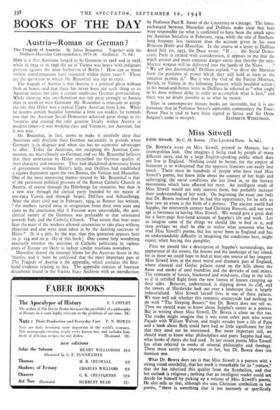BOOKS OF THE DAY
Austria—Roman or German ? '
How is it that Austrians longed to be Germans in 1918 and in 1938, while in 1934 or in 5946 the air of Vienna was heavy with indignant protests against the alien barbarism of Berlin ? How can so many violent transformations have occurred within thirty years ? Those are the questions to which Mr. Braunthal sets out to reply. The tragedy of Austria is that Austria is a political ghcst without flesh or bones, and that there has never been any such thing as an Austrian nation but only a certain south-cast German provincialism. While showing why anti-Semitism was felt more strongly in Austria than in north or west Germany Mr. Braunthal is reluctant to accept the fact that Hitler was a typical Upper Austrian from Linz. While he accepts certain Socialist formulae a little too readily,'he reminds one that the Austrian Social Democrats achieved great things in the 'twenties and created the only genuine loyalty within Austria in modern times—it was working-class and Viennese, not Austrian, but it was true.
Mr. Br‘unthal, in fact, seems to make it painfully clear that Austrians only disclaim their German nationality in periods when Germany is in disgrace and when she has no economic advantages to offer. Today the Austrians, not excepting the Austrian Com- munists, are marvellously un-German, and yet Mr. Braunthal believes that their annexation by Hitler intensified the German quality of their character and emotions. They had abandoned democratic forms of government without Hitler's help, and Dollfuss had established a regime dependent upon the two Romes, the Vatican and Mussolini. One of the most interesting themes treated by Mr. Braunthal is that of the persistent political pressure of the Roman Catholic Church in Austria, of course through the Habsburgs for centuries, but then in a new way through the clerical party founded by the mayor of pre-1914 Vienna and through Seipel, Dollfuss and Schuschnigg. After the short civil war in February, 1934, as Renner has written, " the workers turned away in resignation from their own state and came to the conclusion that if Fascism were unavoidable, the anti- clerical variety of the Germans was preferable to that orientated 'towards Italy and the Catholic Church. That meant that four years later the mass of the workers allowed annexation to take place without objection and also were soon taken in by the dazzling successes of Hitler." (It is a pity, by the way, that this quotation appears both on p. 124 and on p. 183 of this book.) One cannot help wondering anxiously whether the activities of Catholic politicians in various parts of Europe are likely to induce similar reactions nowadays. Mussolini shared the external blame for the Austrian fiasco in the 'thirties, and it must be confessed that the most important part of The Tragedy of Austria is the appendix, which contains the first- hand evidence relating to this. The appendix consists of fourteen documents found in the Vienna State Archives with an introduction
by Professor Paul R. Sweet of the University of Chicago. The letters exchanged between Mussolini and Dollfuss make clear that both were responsible for what is confirmed to have been the attack upon the Austrian Socialists in February, 1934, while the role of Starhem- berg becomes less innocent than the account given in his own Between Hitler and Mussolini. In the course of a letter to Dollfuss dated July 1st, 1933, the Duce wrote : " If . , . the Social Demo- cratic Party is treated with consideration, it appears to me that the much greater and more concrete danger exists that thereby the anti- Marxist weapon will be delivered into the hands of the Nazis. . . ." " We are also determined," Dollfuss replied, " to drive the Marxists from the positions of power which they still hold as soon as the situation permits it." But it was the visit of the Fascist Minister, Suvich, to Vienna in the following January which heralded action ; in his bread-and-butter letter to Dollfuss he referred to "what ought to be done without delay in order to accomplish what is best," and there was no doubt possible as to what he meant.
Slips in contemporary history books are inevitable, but it is un- fortunate that in Professor Sweet's admirable commentary the Four-: Power Pact is said to have been signed at Stresa and Sir Orme


































 Previous page
Previous page